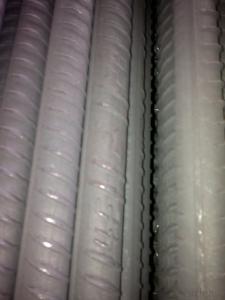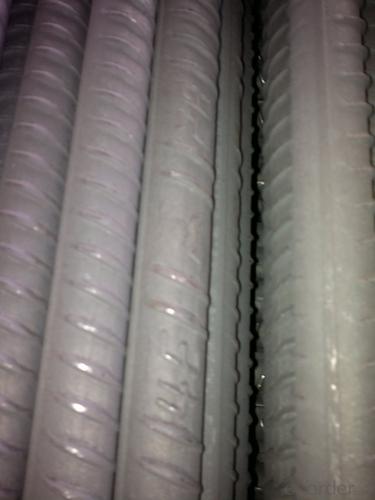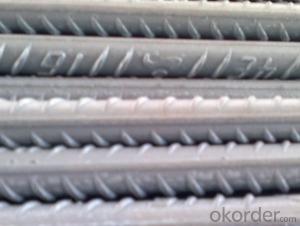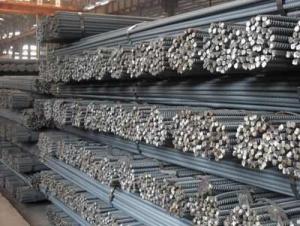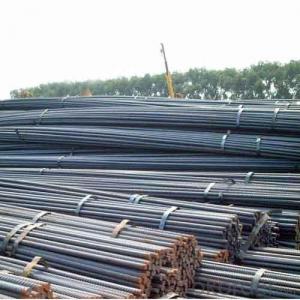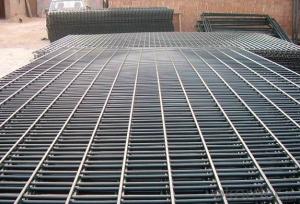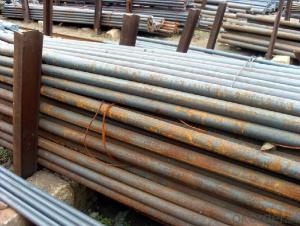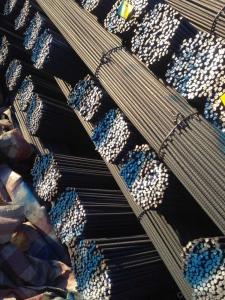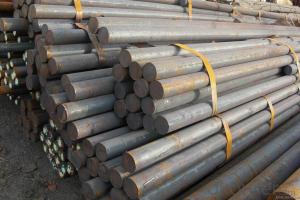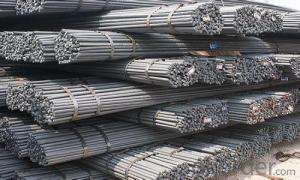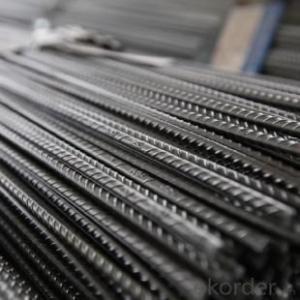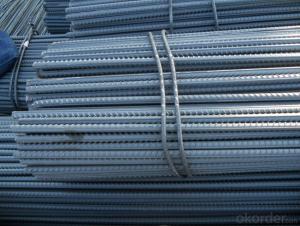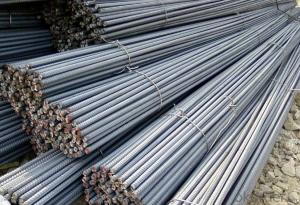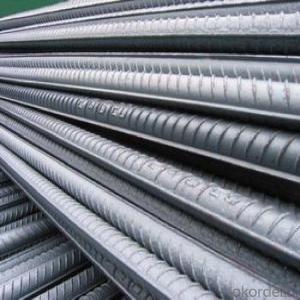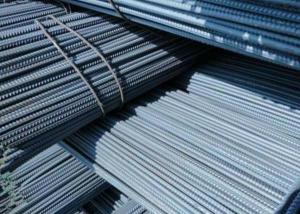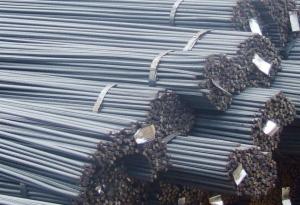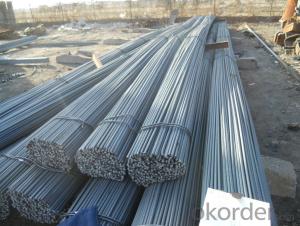GB/UK/USA STANDARD Deformed Steel Bar
- Loading Port:
- China Main Port
- Payment Terms:
- TT or LC
- Min Order Qty:
- -
- Supply Capability:
- -
OKorder Service Pledge
OKorder Financial Service
You Might Also Like
Product Description:
OKorder is offering GB/UK/USA STANDARD Deformed Steel Bar at great prices with worldwide shipping. Our supplier is a world-class manufacturer of steel, with our products utilized the world over. OKorder annually supplies products to European, North American and Asian markets. We provide quotations within 24 hours of receiving an inquiry and guarantee competitive prices.
Product Applications:
GB/UK/USA STANDARD Deformed Steel Bar are ideal for structural applications and are widely used in the construction of buildings and bridges, and the manufacturing, petrochemical, and transportation industries.
Product Advantages:
OKorder's GB/UK/USA STANDARD Deformed Steel Bar are durable, strong, and resist corrosion.
Main Product Features:
· Premium quality
· Prompt delivery & seaworthy packing (30 days after receiving deposit)
· Corrosion resistance
· Can be recycled and reused
· Mill test certification
· Professional Service
· Competitive pricing
Product Specifications:
Specifications of Deformed Steel Bar:
Standard | GB | HRB335, HRB400, HRB500 | |
UK | G460B, B500A, B500B,B500C | ||
USA | GR40, GR60 | ||
Diameter | 6mm,8mm,10mm,12mm,14mm,16mm,18mm,20mm, 22mm,25mm,28mm,32mm,36mm,40mm,50mm | ||
Length | 6M, 9M,12M or as required | ||
Place of origin | China mainland | ||
Application | building,construction,road,bridge etc | ||
Brand name | DRAGON | ||
Theoretical weight and section area of each diameter as below for your information:
Diameter(mm) | Section area (mm²) | Mass(kg/m) |
6 | 28.27 | 0.222 |
8 | 50.27 | 0.395 |
10 | 78.54 | 0.617 |
12 | 113.1 | 0.888 |
14 | 153.9 | 1.21 |
16 | 201.1 | 1.58 |
18 | 254.5 | 2.00 |
20 | 314.2 | 2.47 |
22 | 380.1 | 2.98 |
25 | 490.9 | 3.85 |
28 | 615.8 | 4.83 |
32 | 804.2 | 6.31 |
36 | 1018 | 7.99 |
40 | 1257 | 9.87 |
50 | 1964 | 15.42 |
Usage and Applications of Deformed Steel Bar:
Deformed bar is widely used in buildings, bridges, roads and other engineering construction. Big to highways, railways, bridges, culverts, tunnels, public facilities such as flood control, dam, small to housing construction, beam, column, wall and the foundation of the plate, deformed bar is an integral structure material. With the development of world economy and the vigorous development of infrastructure construction, real estate, the demand for deformed bar will be larger and larger..
Packaging & Delivery of Deformed Steel Bar:
Packaging Detail: products are packed in bundle and then shipped by container or bulk vessel, deformed bar is usually naked strapping delivery, when storing, please pay attention to moisture proof. The performance of rust will produce adverse effect.
Each bundle weight: 2-3MT, or as required
Payment term: TT or L/C
Delivery Detail: within 45 days after received advanced payment or LC.
Label: to be specified by customer, generally, each bundle has 1-2 labels
Trade terms: FOB, CFR, CIF
Deformed Steel Bar in Coil
Produce Line of Deformed Steel Bar
Note:
1. Our products are produced according to national standard (GB), if not, supply according to national standards (GB) or agreement as customer required.
2. Other Grade and Standard Deformed Steel Bar we can supply:
Grade: GR40/GR60, G460B/B500A/B500B/B500C,BST500S
Standard: ASTM, BS, DIN
The Minimum Order Quantity of these products is high, and need to be confirmed.
3. We can not only supply Deformed Steel Bar; if you need anything about building materials, please contact us for further information.
4. Please send us your detail specifications when inquire. We will reply to you as soon as possible. We sincerely hope we can establish a long stable business relationship
FAQ:
Q1: Why buy Materials & Equipment from OKorder.com?
A1: All products offered byOKorder.com are carefully selected from China's most reliable manufacturing enterprises. Through its ISO certifications, OKorder.com adheres to the highest standards and a commitment to supply chain safety and customer satisfaction.
Q2: How do we guarantee the quality of our products?
A2: We have established an advanced quality management system which conducts strict quality tests at every step, from raw materials to the final product. At the same time, we provide extensive follow-up service assurances as required.
Q3: How soon can we receive the product after purchase?
A3: Within three days of placing an order, we will begin production. The specific shipping date is dependent upon international and government factors, but is typically 7 to 10 workdays.
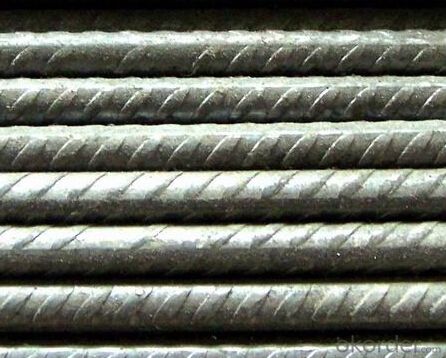
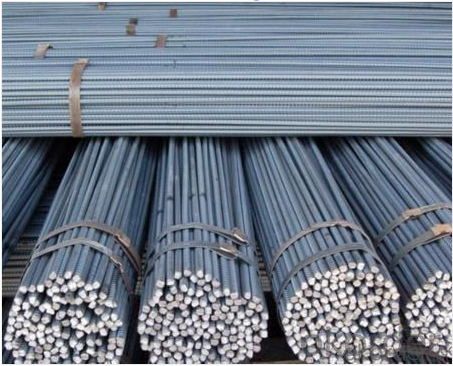
- Q: What are the advantages of using fiber-reinforced polymer (FRP) rebars over steel rebars?
- Using fiber-reinforced polymer (FRP) rebars instead of traditional steel rebars in construction projects offers several advantages: 1. Superior corrosion resistance: FRP rebars do not corrode like steel rebars, which are prone to rust and deterioration when exposed to moisture and chemicals. This property significantly enhances the durability and lifespan of structures, especially in harsh environmental conditions. 2. Lightweight nature: FRP rebars are significantly lighter than steel rebars, making them easier to handle, transport, and install. This lightweight characteristic also reduces the overall dead load of a structure, allowing for more efficient design and construction. 3. Impressive strength-to-weight ratio: Despite being lightweight, FRP rebars possess a high strength-to-weight ratio, enabling them to bear heavy loads while maintaining their structural integrity. This quality makes FRP rebars ideal for applications where weight reduction is desired without compromising strength, such as in bridge decks and seismic reinforcement. 4. Non-magnetic and non-conductive properties: Unlike steel rebars, FRP rebars are non-magnetic and non-conductive. This feature proves advantageous in structures that require non-magnetic properties, like MRI rooms in hospitals, or situations where electrical conductivity needs to be minimized, such as in power plants or near electrical equipment. 5. Flexibility in design: FRP rebars can be manufactured in various shapes and sizes, offering design flexibility and customization options to meet specific project requirements. They can be easily cut and shaped on-site, allowing for seamless integration into complex geometries and curved structures. 6. Thermal compatibility: FRP rebars possess a low coefficient of thermal expansion, meaning they expand and contract at a similar rate to the surrounding concrete. This thermal compatibility reduces the risk of cracking and ensures better long-term performance of the structure, especially in areas with extreme temperature variations. 7. Outstanding durability: FRP rebars exhibit excellent long-term durability, even in aggressive environments. They are resistant to alkalis, chemicals, and UV radiation, ensuring their performance and structural integrity over an extended period. 8. Environmentally friendly: FRP rebars are considered more environmentally friendly than steel rebars due to their minimal carbon footprint. They require less energy to produce and generate fewer greenhouse gas emissions during manufacturing. Additionally, FRP rebars are non-toxic and do not pose a threat to the environment during their lifespan or at the end of their service life. Overall, the benefits of using FRP rebars make them a viable alternative to steel rebars in various construction applications. They offer improved durability, lightweight design, corrosion resistance, and enhanced structural performance.
- Q: Can steel rebars be used in marine environments?
- Yes, steel rebars can be used in marine environments, but they need to be properly coated or made from corrosion-resistant materials (such as stainless steel) to prevent rusting and degradation caused by saltwater exposure.
- Q: Can steel rebars be used in hospital construction?
- Yes, steel rebars can be used in hospital construction. Steel rebars are commonly used in reinforced concrete structures, including hospitals, to provide strength and support to the building. They help enhance the structural integrity and ensure the safety and durability of the hospital construction.
- Q: Can steel rebars be used in structures with high carbonation levels in concrete?
- Using steel rebars in structures with high carbonation levels in concrete is not advisable. Carbonation is a chemical reaction that occurs when carbon dioxide reacts with the alkaline components present in concrete. This reaction leads to a decrease in the alkalinity of the concrete, which can result in the dissolution of the protective layer surrounding the steel rebars. Consequently, the steel becomes exposed to corrosion, ultimately weakening the structure over time. To minimize the risk of corrosion, it is recommended to employ alternative materials such as stainless steel rebars in structures with high carbonation levels. Stainless steel rebars exhibit superior resistance to corrosion compared to carbon steel rebars, enabling them to withstand the harsh environment created by elevated carbonation levels in concrete. Furthermore, it is advisable to consider additional corrosion protection measures, including epoxy coating or increased concrete cover thickness, to further enhance the structure's durability and longevity.
- Q: How are steel rebars protected from concrete spalling?
- Steel rebars are protected from concrete spalling through the use of two main methods: epoxy coating and concrete cover. Epoxy coating is applied to the rebars to prevent direct contact with the concrete, forming a protective layer that prevents corrosion. Additionally, a sufficient concrete cover is provided around the rebars to shield them from environmental factors and potential damage, ensuring their long-term durability and structural integrity.
- Q: What is the average diameter of steel rebars used in construction?
- The average diameter of steel rebars used in construction typically ranges from 6 to 32 millimeters.
- Q: Can steel rebars be used in bridge construction projects?
- Steel rebars are frequently utilized in bridge construction projects. They serve as reinforcement in concrete structures, including bridges, thereby enhancing their load-bearing capacity and ability to withstand tension, compression, and bending forces. Moreover, steel rebars possess remarkable durability, enabling them to endure harsh environmental conditions, which is essential for ensuring the longevity and structural soundness of bridges. Furthermore, their malleability allows for easy shaping and bending, facilitating the construction process and accommodating specific design requirements. In conclusion, steel rebars are highly esteemed in the field of bridge construction due to their exceptional mechanical properties and reliability.
- Q: How do steel rebars affect the durability of concrete structures?
- Steel rebars greatly enhance the durability of concrete structures. By reinforcing the concrete, rebars improve its tensile strength, preventing cracking and enhancing its ability to withstand external forces and loads. This reinforcement also helps to increase the overall lifespan of the structure, making it more resistant to corrosion, fatigue, and other forms of degradation.
- Q: How are steel rebars coated with epoxy?
- Epoxy coating, also known as epoxy rebar coating, is utilized to coat steel rebars for the purpose of protection against corrosion and other environmental factors. To initiate the process of coating steel rebars with epoxy, the first step involves preparing the surface. This essential stage entails the thorough cleaning of the rebars to eliminate any dirt, oil, or rust present. The significance of surface preparation lies in ensuring proper adhesion of the epoxy to the steel surface. Once the surface is adequately prepared, the application of the epoxy coating commences. There are various methods available for this application, including spraying, brushing, or dipping the rebars into an epoxy solution. The choice of method depends on factors such as the rebars' size and shape, as well as the desired thickness of the epoxy coating. Subsequent to the application of the epoxy, the rebars are allowed to cure. Curing is the process during which the epoxy hardens and attains its maximum strength. The duration of this process may vary depending on the specific epoxy product utilized, but it generally takes several hours or even days for the epoxy to fully cure. Upon achieving complete curing, the coated rebars are prepared for use. The epoxy coating acts as a protective barrier, effectively preventing the steel rebars from rusting and deteriorating over time. Additionally, it enhances the rebars' resistance to chemicals, moisture, and other corrosive substances. To summarize, epoxy coating proves to be an efficient method for safeguarding steel rebars against corrosion and extending their lifespan. It finds extensive application in construction projects wherein rebars are exposed to harsh environmental conditions, such as bridges, buildings, and infrastructure projects.
- Q: Can steel rebars be used in the construction of swimming pools or water tanks?
- Yes, steel rebars can be used in the construction of swimming pools or water tanks. Steel rebars are commonly used as reinforcement in concrete structures to increase their strength and durability. In swimming pool or water tank construction, steel rebars are typically placed within the concrete walls and floors to provide additional support and prevent cracking or structural failure. The rebars are designed to withstand the corrosive effects of water and can effectively reinforce the concrete structure to resist the pressure exerted by the water. However, it is important to ensure that the steel rebars are properly coated or protected to prevent corrosion, as constant exposure to water can lead to rusting over time. By incorporating steel rebars in the construction of swimming pools or water tanks, the overall integrity and longevity of the structures can be significantly improved.
Send your message to us
GB/UK/USA STANDARD Deformed Steel Bar
- Loading Port:
- China Main Port
- Payment Terms:
- TT or LC
- Min Order Qty:
- -
- Supply Capability:
- -
OKorder Service Pledge
OKorder Financial Service
Similar products
Hot products
Hot Searches
Related keywords
